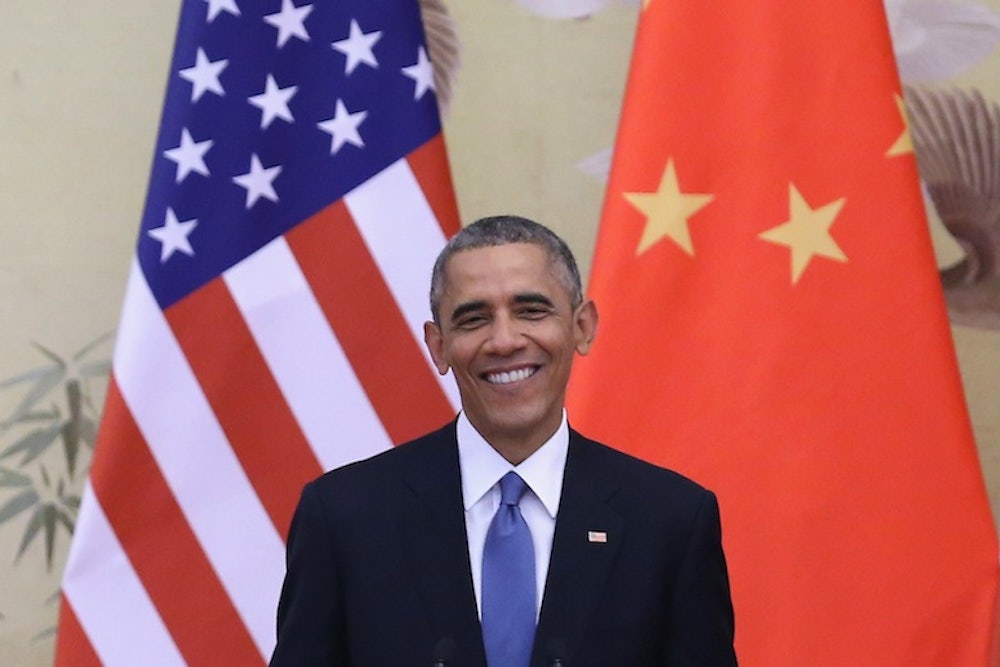The failed Obamacare presidency continued not to fail this week. Twice.
The first time it happened was on Tuesday morning, when Craig Spencer left Bellevue Hospital in New York. Spencer is the Doctors Without Borders volunteer who famously rode the subway and went bowling a day before developing Ebola symptoms. The president and his advisers, including Centers for Disease Control Director Thomas Frieden, assured the public that everything would be fine. Spencer had not been symptomatic while traveling around the city and only symptomatic people can transmit the disease (and, even then, only through bodily fluids).
Obama’s critics said that the Administration was under-reacting—that it needed to ban travel to West Africa or at least quarantine returning health workers. Obama, worried that such actions would deter health care workers from going overseas, resisted the pressure. Twenty-one days later, Spencer has recovered from Ebola, nobody else in New York has gotten the disease, and workers remain free to help fight the epidemic in Africa—where it remains a potent threat not only to locals, but also to regional and eventually global stability. New cases might yet show up in the U.S., but the public health infrastructure seems prepared to handle it. You can read more about it here.
Obama's other non-failure came late on Tuesday night, when, while traveling in Asia, he announced that he’d secured a major agreement on climate change with the Chinese. The U.S. is the world’s second largest producer of greenhouse gases. China is the first. But Chinese officials have sometimes resisted calls for reducing carbon emissions, because they said China was still a developing nation that needed to burn carbon fuels in order to modernize its economy. Here in the U.S., conservatives cited that resistance as reason the U.S. should not act to reduce its emissions. Why bother, the argument went, when the Chinese wouldn’t agree to do something about their carbon problem?
Now the Chinese have done just that. Under the terms of the agreement, both the U.S. and China agreed to greenhouse gas targets—which for the U.S. means continued reduction of emissions and for China means slowing the growth in emissions until they stop rising in 2030 (or maybe sooner, if China can achieve that). Those are ambitious targets that will challenge both countries, albeit for different reasons. But it’s a legitimately big deal, for reasons Rebecca Leber laid out at QED on Wednesday. Among other things, she writes, it gives other countries more incentive to set their own emissions targets—a necessary precursor for reaching an international agreement on climate at next year’s summit in Paris.
The two milestones are a pretty good proxy for the two kinds of achievements this Administration has made. As my colleague Danny Vinik has observed, Obama catches a lot of grief for his lack of crisis management. There are times he's deserved that. But his patient, analytic approach to situations like the influx of young Central American immigrants at the Texas border seems largely to have worked. Obama sometimes stumbles at first, which may be why critics are quick to call every new episode his Katrina. But remember this: Obama actually had a Katrina, it was called Sandy, and by all accounts the Administration handled that disaster well.
The agreement with China, meanwhile, is part of Obama’s broader strategy to reduce U.S. emissions. It's a legacy that will last long after he leaves office, in the form of a planet that is heating more slowly. Policy success isn't the same as political success, of course. Last week's election showed that. And ultimately the two are related. On climate, like most issues, either Congress or Obama's White House successors could halt or even reverse progress in the future.
But the China agreement is something history will probably remember well, just as it does the Recovery Act and the Affordable Care Act—even if those two achievements, like Obama’s environmental accomplishments, get remarkably little love right now.
—Jonathan Cohn
News from Wednesday
SAME-SEX MARRIAGE: The U.S. Supreme Court denied a request to block same-sex marriage in Kansas on Wednesday, but there's a dispute—and controversy—over whether marriages can proceed because of other legal action taking place. (John Hanna and Bruce Smith, Associated Press)
FERGUSON: The parents of Michael Brown traveled to the U.N in Geneva to seek justice for their son, according to a statement from the family’s lawyer. (Robert Evans, Reuters)
BOSTON MARATHON BOMBING: Lawyers representing bombing suspect Dzhokhar Tsarnaev requested that a judge order federal prosecutors to release any evidence they have that the older Tsarnaev brother, Tamerlan, was also involved in the bombing. (Denise Lavoie, Associated Press)
Articles worth reading
Worse than Bush v. Gore. Linda Greenhouse is gobsmacked that the Supreme Court took the latest Obamacare case, but wonders whether Chief Justice Roberts will vote with the four consevatives. (New York Times)
Did wage stagnation destroy the Democrats at the midterms? David Leonhardt says yes. Ezra Klein isn't so sure. (New York Times, Vox)
Why bankers are acting paranoid. Jesse Eisinger explains why hedge fund managers are crying wolf over inflation. (ProPublica)
At least something’s going right. Max Fisher writes that the climate deal with China is President Obama’s biggest foreign policy success. (Vox)
Meet Thoreau 2.0. Alana Semuels profiles a man who is so anti-war that he quit his $100,000-salaried job so that he could stop paying federal income tax. (The Atlantic)
Stories We’re Watching
Whether Darren Wilson will face charges—and how Ferguson will react.
At QED
Rebecca Leber had more to say about the climate treaty, and took a close look at the reaction from Republicans. (No, they weren't happy.) Meanwhile, Brian Beutler wrote about the now-infamous Jonathan Gruber videos—and what they don't tell us about the Affordable Care Act. Noam Scheiber wonders whether Hillary Clinton can tap into the economic populism Democrats will need to win the 2016 election.
